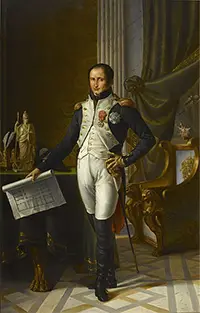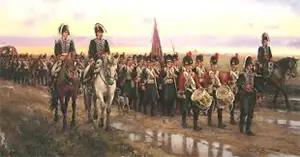Joseph Bonaparte: King of Spain and Naples
Part 2: Naples and Spain Joseph Bonaparte served as French ambassador to Rome and in other diplomatic roles. He negotiated a treaty between France and the United States in 1800, between France and Austria in 1801, and between France and Great Britain (the famous Treaty of Amiens) in 1802. He also helped negotiate the Louisiana Purchase, taking land that had recently been acquired from Spain and selling it to the U.S., in 1803 
By 1805, Joseph was definitely in a subservient role to his brother, now Emperor of the French. Napoleon's new target during the War of the Fourth Coalition was the Kingdom of Naples, and he wanted his brother to be the new monarch, displacing the current king, Ferdinand IV. Joseph obeyed Napoleon's order to move to Rome. In March 1806, after a defeat of the forces defending Ferdinand IV, Napoleon issued a decree that his brother was King of Naples. Joseph Bonaparte set about ruling from Naples. One of his first acts was to ascertain whether it was possible to take control of Sicily. Although his title was ruler of that island, it wasn't exactly in the fold and after a tour of the island, Bonaparte decided not to press the issue. Instead, he focused on Naples, introducing reforms that modernized the kingdom. Poor people found jobs in building roads and other public works projects. People of all classes found themselves paying lower taxes. Prisoners no longer had to serve in the army. Another priority was education, including the establishment of colleges for young girls. Bonaparte was King of Naples for two years. During that time, he doubled the state revenue. In 1808, he handed the throne over to the French military commander, Joachim Murat, whose wife was Caroline Bonaparte, Joseph's sister. He had handed over the throne of one kingdom in order to take the throne of another. Napoleon, in November 1806, had created the Continental System, a progenitor of the European Common Market that was designed to exclude the U.K. from European trade. Portugal refused to be bound by such a system, and the Royal Navy ruled the waves in and around Portugal at the time, so France couldn't do much about that. As the trade war escalated, Napoleon decided to send troops to Portugal, in order to force that country to comply with the blockade. During the last few months of 1807 and the first few months of 1808, more than 100,000 French troops marched into Spain, on their way to Portugal. 
The occupation began on Oct. 12, 1807, with 28,000 French troops under Jean-Andoche Junot marching from France into Spain. Bonaparte and Spain's King Charles IV later that month signed the Treaty of Fontainebleau, by which the two monarchs agreed to share in an invasion of Portugal, with Spain adding 25,500 troops, and then divide its territory between them. The invasion began on Nov. 19, and the Portuguese royal family fled to Brazil, transferring the seat of government there. Junot occupied Lisbon on December 1. Spain had been an ally of France for many years. The two countries had recently collaborated on a plan to break the U.K. naval blockade in 1805. However, at this point in time, the Spanish king was involved in a major quarrel with the heir apparent, his oldest son, Ferdinand. The quarrel had become quite public and had divided much of the country, with both men having support from various regions. Another large force from France marched into northern Spain in February 1808 and occupied the regions of Catalonia and Navarre, including the cities of Barcelona and Pamplona. Bonaparte named Marshal Joachim Murat commander of all French troops in Spain. He entered Madrid at the head of a large army on March 23. Both Charles IV and Ferdinand pressed their case to Bonaparte, who was clearly the power behind the Spanish throne at this point, and the French emperor summoned the royal father and son to Bayonne, in France, to discuss. Bonaparte, at a meeting on May 5, forced Charles IV to abdicate and then forced both king and king-in-waiting to step aside and claimed the throne for himself. He promptly then made Joseph King of Spain. A large-scale uprising ensued. The people of Spain didn't at all want a foreigner ruling their country, and they put up quite a fight during a number of years, waging guerrilla war and requiring France to keep many more troops in the country than it otherwise would have. Local militias known as Miquelets won several battles against French troops. French supplies of men, money, and weapons were not limitless, and the occupation army grew to such an extent that it had a bearing on actions that the French Army could take elsewhere in Europe.Joseph Bonaparte entered Madrid on July 20, after the French forces had restored stability in the capital. He was crowned King of Spain on July 25. Not long afterward, the uprising forced him to flee. This was the beginning of the Peninsular War. Next page > Later Life > Page 1, 2, 3 |
|
Social Studies for Kids
copyright 2002–2024
David White




